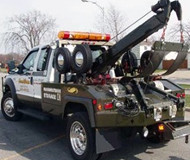2/19/2014
Utah: Repo Men Sue To Overturn Private License Plate Reader BanRepossession industry claims free speech rights in bid to photograph and track license plates in Utah.

Private companies that spy on motorists are suing the state of Utah over a law that limits commercial use of automated license plate readers (ALPR, also known as ANPR in Europe). The firms Digital Recognition Network Inc and Vigilant Solutions told the US District Court for the District of Utah that they have a First Amendment right to photograph motorists, identify the vehicle and record the time and GPS coordinates in a searchable database accessible to clients nationwide.
Digital Recognition Network (DRN) mounts license plate reader cameras on tow trucks so it can distribute the collected data to "clients and partners," usually repossession firms and collection agencies. In Utah, Swift Towing, American Automotive Recovery, Inner Global Recovery and Repros Recovery together spent $120,000 buying license plate reader cameras from the firm. Vigilant Solutions typically offers information from these cameras to law enforcement agencies.
Last year, Utah adopted a ban on license plate readers that only allows their use by law enforcement for "conducting criminal investigations," by meter maids to issue parking tickets or by toll roads to generate bills. Other uses are prohibited.
"A person or governmental entity may not use an automatic license plate reader system," Utah Code Section 41-6a-2003 states.
This has forced the license plate reader companies to stop doing business in Utah for fear of being charged with a class B misdemeanor. The companies filed suit in the hopes of turning the cameras back on.
"DRN and Vigilant further seek a preliminary injunction against the application or enforcement of the act so that they can resume their constitutionally protected speech -- namely, the dissemination and collection of license-plate data using ALPR systems -- in Utah," DRN attorney J. Ryan Mitchell wrote to the court. "Because of the Act, DRN can no longer disseminate or sell license-plate data collected by ALPR systems in Utah."
The companies argued the state is not truly interested in protecting privacy since it allows so many intrusive uses of license plate readers, as long as the government is involved. In effect, they argued that the ban on private use hinders the repossession industry's freedom of expression.
"The act is a content-based speech restriction," Mitchell wrote. "The illegality of speech under the statute turns on the content of what is being photographed and transmitted through ALPR systems -- license-plate information is covered, but other content is not."
The industry insists that location history data and license plate numbers represent public information, and there is no privacy concern with selling this data. Utah's attorney general has not filed a formal response to the suit.


